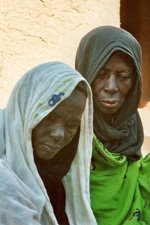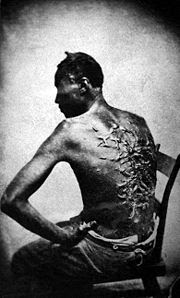You are sold and bought, your children go to school if ‘the master’ approves. You will marry when and if the master decides; your children are born as slaves and live the family legacy as servants and third class citizens. In other words, you can say 'Slavery runs in your family.'
 Slavery in Mauritania has been going on for centuries. It has primarily been the domination of the light-skinned Moors over the rim of sub-Saharan black Africans.
Slavery in Mauritania has been going on for centuries. It has primarily been the domination of the light-skinned Moors over the rim of sub-Saharan black Africans.Unlike other parts of Africa where domination was through political leadership in the post colonial Era like the Kikuyu in Kenya, Ibo in Nigeria, Tutsi’s in Rwanda, in Mauritania it was enslavement. Slavery was officially abolished over (just) 20 years ago.
It is estimated that 20% of Mauritania’s 3.3 million people are slaves. The slavery that is practiced and entrenched in Mauritania is the kind that is referred to as bonded labour. This is where people are enslaved to clear debt, that at times is not of their own making. (Above Left: Freed slaves in 2001)
Like every typical African government, denial is the Mauritanian government’s defense, they deny that slavery exists. The word ‘slave’ has been banned from use by the media, and the use of the word puts many foreign journalists at risk of arrest and deportation.
Though it has been pointed out that slavery cuts across the race
 divide; both black and white Mauritanians own slaves. Mauritania’s most powerful families are black as is the case of the country’s second – ranking leader, the president of the national senate who’s a black Moor.
divide; both black and white Mauritanians own slaves. Mauritania’s most powerful families are black as is the case of the country’s second – ranking leader, the president of the national senate who’s a black Moor.The government is also alleged to have a history of instituting racist policies. In 1987, the army and police force went to the extreme of removing black officers.
Then yet another 60,000 blacks were deported at gunpoint two years later to Neighbouring Senegal. There are Mauritanian refugees living along the Senegal – Mauritania border. The notion among many is that the pre-dominant white Moors are trying to create a state of their own. They support this with the fact that the former French colony has adopted Arabic as the country’s official language.
(Right :1863 slave, with scars reulting from whipping)
Elsewhere in Niger, slavery is part of culture, not so much an institution of government, but it is open. Since its independence in 1960, Niger has had quite a bit of ups and down especially in the 80’s and 90’s. Democracy was finally restored in 1999, with the constitution and the penal code prohibiting slavery and slave trade, but that hasn’t stopped it. It’s only in 2007, you read right, 2007 that Niger criminalized Slavery.
 Asibit, (shown) a former slave escaped in June of 2004 after 50 years of enslavement. Her mother, husband and children were all slaves. She worked all day, preparing meals for her master, moving a heavy tent four times a day so her master and his mistress were not scorched by the sun. She milked camels, fetched water and firewood and performed other taxing chores without pay.
Asibit, (shown) a former slave escaped in June of 2004 after 50 years of enslavement. Her mother, husband and children were all slaves. She worked all day, preparing meals for her master, moving a heavy tent four times a day so her master and his mistress were not scorched by the sun. She milked camels, fetched water and firewood and performed other taxing chores without pay.In her words, Asibit says, "We were never paid; I was only given one tenth of the camel milk and leftovers. I have never known happiness until this month of freedom. Now I can go to bed when I want, no one insults me. Now that I am free, I can live as I please."
This is going on in Africa! I still can’t believe it. Slavery! Cultural practices need to be revised and we need to fight for equality here and for ourselves, that’s the way we can move forward. No one is inferior to anyone else, regardless of religion, race, sex or lineage. It’s just so wrong!

No comments:
Post a Comment